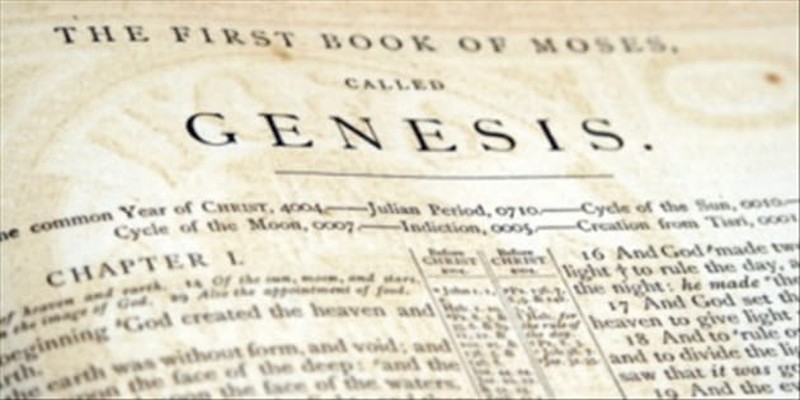What Do You Believe About the Bible?
- Marvin A. McMickle
- Updated May 04, 2021

A professor of humanities at
However, there is one statement about literature made by Professor Bloom I cannot overlook. In the
Apparently the Bible was included in one of his earlier lists of the five most influential books; but this time around the Bible was dropped from the list. When someone asked him how he could possibly leave the Bible off of his list of the five most important books ever written he answered by saying, "It has gotten all mixed up with questions of belief in what is now an insanely religious country." 1
Imagine that; the Bible is not included in a list of the five most important books in the history of Western civilization because it spends too much time dealing with matters of faith and religion. I mean no disrespect to Professor Bloom or to Chaucer, Cervantes, Homer, Dante or Shakespeare, but when was the last time that you or anybody you know actually read any of those "five most important books"? Maybe you read them when you were in high school or in college; and maybe you have read something by Shakespeare since those days. But are those really the five most important books in Western Civilization to the exclusion of the Bible?
If anybody in this congregation were hospitalized and called the pastor to your bedside, from what book would you hope that I would read? If your mind is troubled and your soul cannot find any peace to which book would you turn? If there was only one book you could take with you through life, would it be something by Shakespeare, or Chaucer or Dante; or would it be something by Matthew, Mark, Luke and John? I really believe that most of what is wrong in our country is the result of backward thinking scholars like Professor Bloom who say, "Our ways of thinking and feeling about ourselves, those we love, those we hate, those we realize are hopelessly 'other' to us - are more shaped by Shakespeare than they are by the experiences of our own lives." 2
I cannot speak for anybody else in this church today, but it is as clear to me as night is from day that there is only one book ever written that truly informs my thoughts and feelings about who we should love and how we should treat the person who is the "other', and that book is the Bible. I may never pick up Don Quixote or The Canterbury Tales again in my life, but not a day goes by in my life that I do not slip a Bible into my pocket and read it throughout the day. I mean no disrespect to the distinguished professor from Yale, but when it comes to his choice of reading material he certainly does not speak for me or for millions of others across this country and around the world.
We need a book that speaks about faith. We need a book that can lift our eyes and our hopes beyond the realities of this present generation. We need a book that has the power to search our hearts and our minds and our values. We need a book that is not dependent upon popularity polls among university professors. And today I have come to lift up that book; it is the Bible. It has God as its author, salvation as its content and its appeal is timeless as it has touched every continent on earth without interruption over the last 3,000 years!
In
I want you to envision with me a relay race at a track meet where several teams are competing against one another. This is not one of those races where one person runs against another person to see which one is the fastest. A relay race is much more complicated, because the speed of each runner is not the only factor to be considered. In a relay race there are four runners on each team who run a certain distance (usually 110 or 220 meters) while carrying a baton. Once each runner has run that distance he or she must pass the baton on to the next runner who will cover the same distance in a second lap. Each of the four runners covers the same distance, but three times during that race the baton is exchanged from one runner to the next. This is a difficult process, because the runner who is coming to the end of one lap must slap the baton into the hand of the person who is beginning the second lap after that second person has already begun to run.
I have seen these kinds of races many times in my life, and I have noticed that one team can easily have the fastest runners on the field but still lose the race, because at one point or another in that crowded field one of the runners fails to successfully pass the baton on to the next person. It does not matter how fast the next runner is -- by the time you stop and pick up that baton in a competitive field of runners you are too far behind to ever catch up to the field, much less to win the race. The critical component of a relay race is not only how fast each runner can cover their distance, but also how successful each runner is passing on the baton.
I begin with this image of a relay race and the passing of the baton; because that is the best way that I can think of to illustrate what each generation of Christians has done with the Bible. You and I have two sacred duties, two spiritual obligations so far as the Bible is concerned. The first obligation is to be certain that we live our own lives and govern our own conduct according to the teachings and values found in that holy book. Each one of us must make the words of
However, as in a relay race, there is something else that we must be mindful of beyond how well we run our own portion of the race. We also have the obligation to be sure that we are passing the Bible on to the generation that comes after us so that its wisdom can be of the same benefit to them that it was to us during our lifetime. I want to remind you that those generations that ran the race ahead of us preserved this book first by living by its truths themselves, and then by passing it on to us. I also need to urge each one of you to recognize that one of the most urgent tasks confronting the adult members of
Let me tell you why it is so important for us to remember the importance of the Bible as an influence on our lives. As in a relay race there are other teams on the field who are also trying to win. There are Muslim or Islamic groups who are trying to win over the hearts and minds of our young people. There are cultural values that are being communicated through movies, TV programs, hip-hop music and videos that are trying to shape the values of our young people. There are movies, songs and video games that glamorize and cheapen sexual activity of all kinds; despite the fact that we live in a world where sexually transmitted diseases like HIV/AIDS is the single largest cause of death among many groups in the African-American community. There is the endless celebration of the drug culture and the use of cocaine, heroin or other illegal substances. Everything I have just named represents another team on the field that is competing for the hearts and minds and values of our children.
How can we equip and prepare our young people to successfully complete their race through life in a world that puts all of these obstacles and temptations in their path? Shall we be sure they have all enrolled in a course in world literature with a concentration on Shakespeare and Chaucer? I think not! The answer, at least in part, is that those of us who are currently adults must be sure that we are passing on to the next generation the teachings and wisdom found in the Bible. First, our young people must see us living by the lessons of the Bible and they must see us studying and reading the Bible for ourselves. Then we must teach it to them, commend it to them and pass it on to them as something as sacred and important as anything we might bequeath to them in our will.
Here is the vulnerability of the Bible: it is at risk of being lost forever whenever any present generation fails or refuses to pass it on to the next generation. Harold Bloom is not the first person to say that the Bible should be dropped in favor of some other books and literary influences. There have long been people who dismissed the relevance of the Bible. Now here is the power of the Bible; that from approximately 1200 BC to the present time, or a period of time of 3300 years one generation of people has been passing this book on to the next without fail. Now the Bible is in the hands of the present generation and it is our turn not just to live by its teachings, but also to pass them on to our children.
I want to submit to you that we need to pay attention to this issue, because while Harold Bloom may not be able to influence those of us who are already established in our faith in Christ and in the scriptures, there is proof that this non-biblical approach to living is taking root in our society. There is a word that has made its way into the vocabulary of contemporary American society, and that word is post-modernism. While that word applies in many different ways, it has one meaning in particular where the life of the church is concerned. The post-modern generation refers to this current generation of younger people who prefer spirituality in general over salvation in the name of Jesus and who no longer have a working knowledge of the Bible. For the first time in history there is a generation on the scene that has not been given, or has not been willing to receive the lessons of the Bible.
This applies primarily to people who are thirty years of age and under, and most people in that group can neither begin nor end any of the stories of the Bible. They are not familiar with the various characters of the Bible. They do not consider the teachings of the Bible when they are making decisions about their lives. If you were to say to them that "the Bible says," they would not be impressed and would not be inclined to be responsive to that message.
For many people in this group the Bible is just another book; no more or less valuable than any other book they might read or consult. For that matter, Christianity is just another religion and Jesus Christ is just another person; no more important or significant than any of the other religions or religious teachers who have come and gone in human history. This group exists because in recent years we have become less intent on passing the Bible on to the next generations. And unless we are aggressive at this moment in time we may give birth to an entire generation of people who know more about P Diddy than they do about Peter and Paul. They will know more about Jay Z than they do about Jesus Christ!
If this is going to be reversed, we will need to offer them a compelling reason for why they ought to adopt the Bible as the guide for their lives. My task today is to set forth the four reasons why I believe in the Bible, why I trust in the teachings of the Bible, and why I think you and I should be careful to safely pass the Bible on to the next generation.
Let me give you my four reasons for wanting to pass the Bible on to the next generation. First, the Bible has greater longevity than any other book ever written. Parts of the Bible date back to the 13th century BC. That means that for 3400 years or for what equates into 136 generations, the Bible has been passed on through the years. Name any other book that has lasted as long as the Bible? Name any other book that has endured the test of time and the passing of the years like the Bible? Part of its mystery and its authority is related to its age.
There are books written by the greatest theologians in history that are not being read by anyone after 20-30 years, but the Bible remains alive after 2,000 to 3,000 years. Over 90% of the books in the library at
The subsequent books have suffered a better fate in that each of them is still in print and doing well. However, the deal with the publisher is that in any year when sales of one of your books falls below 50 copies they cease to promote or market that book. The assumption is that the marketplace is no longer interested in that book any longer. I should probably remind you that most of the books ever written are either out of print already or tottering on the edge. Either way, whether your book is out of print or just being ignored; most books written by human hands have a limited span of years.
I remember checking a book out of my college library in 1968 by a man named Paul Tillich. He was one of the greatest theologians of the 20th century. Everybody was reading Paul Tillich at that time. About twenty years later I went to the campus to speak in the chapel, and afterward I went to browse in that same library. I stumbled up on that same book by Paul Tillich and looked to see who had turned to that book for wisdom since I had checked it out in 1968. This was still in the day when you checked a book out of the library by signing your name to a card in the back of the book that was kept at the front desk by the librarian. I was shocked to discover that between 1968 and 1990, mine was still the last name on the card. Nobody had read or consulted or checked that book out in over twenty years. And yet, every day since 1968 people have been turning to the Bible for light and direction. No wonder Isaiah writes, "The grass withers and the flower fades, but the word of our God shall stand forever." I love and trust the Bible because of its length of existence.
There is a second reason why I love the Bible, and that has to do with its breadth. There is no other book on earth that has been translated into as many different languages as the Bible. There is no other book on earth that has been translated into as many different versions as the Bible. There is no other book on earth that has sold as many copies as the Bible. This is not a book just for Christians in
There is a third reason why I trust and love the Bible, and that has to do with the depths to which this book can reach. No other book of which I am aware has as much of an ability to alter the lives and thoughts of those who read from its pages. The Bible is the one book that could alter the present course of our entire planet and every person on it if we would just obey its teachings.
If we followed the teachings of the Bible we would have no hunger in our nation or around the world. If we followed the Bible we would not be facing a skyrocketing rate of teenage pregnancy or an even higher rate of divorce among adults. If we followed the Bible we would not have failing schools and crumbling cities in the
Charles Stanley has an insert in his Leaders' Bible - it reports that back in the days when prayer and Bible study were a part of public school life the major problems reported by school teachers were: talking in class, chewing gum, making noise, running in the halls, getting out of line, wearing improper clothing and missing the wastebasket. Today, in a world where the Bible has been dropped from the list of most important and influential literature here is how the list reads from our schools; drug abuse, suicide, alcohol abuse, pregnancy, rape, murder and assault. All of this is going on while students are still reading Shakespeare and Homer but while the Bible has been dropped from the curriculum!
The fourth reason why I love and trust the Bible has to do not with its length, or breadth, or depth; but with its height. I love the Bible because of what I believe to be its authorship. The Bible was not written like any other book ever written. Hear Paul remind us once again that "all scripture is inspired" or God-breathed (II Timothy
I trust the Bible because of Whose Word this is; the Word of God. I may listen to the opinions of others, but I will never place those opinions above the teachings of this book. Some people are anxious to find out what Dr. Phil has to say about something, and even more live and die based upon what Oprah says. I personally do not care what either one of them says about anything. I don't watch either of their shows and I do not wait to hear what they think before I make up my mind. But I want to know what God thinks. I want to know what Jesus said. I want to know what the Bible teaches. I want to conform my life to the lessons of this book. I am willing to say "Not my will but thy will be done" when I read this book, because this book is about the will of the eternal and everlasting God.
I cannot speak for anybody else, but I have found the answer for the questions in my life. I have found a rock strong enough to bear my burdens. I have found a light bright enough to illumine my pathway. I have found a friend who will stick closer than any brother. I have found a book that will always be helpful as I journey through this world. I did not find it in Shakespeare or Cervantes. I did not find it in Dante or Chaucer or Homer.
I found it in a book that has stood for over 3500 years. I found it in the book that is known and loved and read in every continent. I found it in the book whose teachings, if they are taken seriously, can address and resolve every problem we confront in life. Finally, I will found my answers and my inspiration in the book that is the revealed and written word of God that will be eternally true. Heaven and earth may pass away, but the word of our God shall stand forever!
Sorry Professor Bloom, but "On Christ the solid rock I stand. All other ground is sinking sand."
_________________
Marvin A. McMickle is Senior Pastor of
_________________
Notes.
1. A Life in Books, Newsweek,
2. Ibid, p. 15.



















